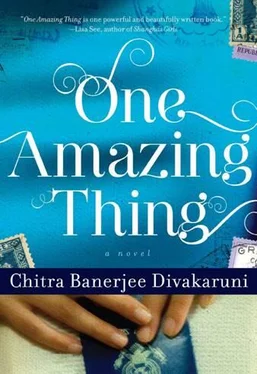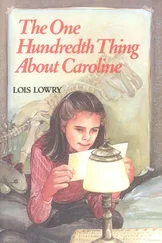(The boy’s own mother will not be unlucky, not in that way. When the boy is in fourth grade, she will collapse at work one day, dying of an aneurysm before the ambulance can get her to a hospital. Later the boy will look up the word in the dictionary, but it will still baffle him.)
When the boy is five and a half, Mary Lou and Jimmy abandon them for Memphis, which is clear across the country. They’re going to live with Mary Lou’s mother, although she constantly bitches at Mary Lou, because Mary Lou can’t make it on her own anymore, and she’s just too tired trying. She cries as she tells the boy’s mother this, wiping at her eyes, smearing mascara over apologetic cheekbones. The boy’s mother doesn’t say anything, but he sees something flicker in her eyes. He thinks it’s anger with Mary Lou for quitting on them. But later he wonders if it’s fear, and that makes him afraid, too. Then Mary Lou and Jimmy are gone, and his memories get a lot worse.
IN THIS AFTERNOON MEMORY, THE BOY IS ABOUT EIGHT, WITH long, untidy hair and clothes that aren’t quite clean. He’s playing by himself in the empty field behind the apartment building that doubles as a junkyard. The junkyard is off-limits-his mother thinks it’s dangerous-but she’s at work and isn’t going to know. Marvin, who lives with them now, is aware of the boy’s disobedience, but Marvin isn’t going to tell his mother. Because then she would insist that the boy stay inside after school, and Marvin wouldn’t like that. In the afternoon, when the boy’s mother is at work, Marvin’s friends come over to the apartment. The boy isn’t sure what they do there, though from the sweetish smoke-smell that lingers after they have left, he can guess at some of it. In any case, he is playing alone in a field overgrown with brambles because there aren’t any kids his age who live around here. If there were, they probably wouldn’t be friends with him, like the children at school who sometimes make fun of his name or shove him around during recess when the teacher on duty isn’t watching but mostly just ignore him.
The boy pretends he’s Robinson Crusoe, alone on his island except for the cannibals who are after him. From behind an abandoned freezer, he trains his binoculars on them, watching them laugh with their pointy cannibal teeth. But they won’t get him; he knows his way around the entire island, the caves and mountain passes where people must travel single file. He has his M1 semiautomatic and one hundred clips of ammo, and he knows how to move quiet as death. He raises his rifle and takes a step forward, then jumps back with a yelp because something furry has just brushed against his shins. It is a kitten.
The kitten is small and scrawny and meows loudly, opening its mouth wide and displaying tiny cannibal-sharp teeth and a very pink tongue. It skitters away when the boy reaches for it, but then lets itself be picked up. Its claws are sharp, too, but the boy doesn’t mind. He thinks it looks like a miniature tiger, and he holds it and strokes its back while the kitten squirms in an attempt to get away. The boy remembers something he read in a book. He sets it down, breaks off a bramble branch, and bobs it up and down. The kitten swipes at it, entranced. They play like this for a while, but then the kitten starts mewing again-with hunger, the boy is sure. So he tucks it inside his shirt-he is afraid he’ll lose it if he leaves it out here-and goes to the apartment. Inside, Marvin’s friends, who scare him, observe him through a haze of smoke. One of them beckons him, asking if he wants a beer. The boy’s face goes hot. Marvin’s friends laugh. He almost backs out. Then he feels the kitten trying to climb up the inside of his shirt. Its tail tickles his chest. He tightens his shoulders and strides past their stares to the fridge-it is his fridge, he reminds himself. His apartment. He pours milk into a bowl. His hand shakes and milk spills on the sticky counter, but only a little. He carries the bowl out to the field.
The kitten laps up the milk and licks the boy’s fingers. Its tongue is sandpaper-rough against his knuckles, and the boy shivers with pleasure. They play some more with the branch, the boy pulling it backward and the kitten pouncing on it so fiercely that right then and there he names it Shere Khan, after the character in The Jungle Book . They play this game for hours, even after the sun sets and the boy shivers in his too-small jacket. Finally he hears the sound he’s been waiting for, the roar of trucks. Marvin’s friends are leaving, and when the boy peers around the edge of the apartment building, he sees to his delight that Marvin is going with them.
It’s simple enough, after that, to carry into the apartment the discarded kitchen drawer that he has already picked out, to hide it behind the couch where he sleeps nowadays, beside the cardboard boxes that hold his clothes and books. He lines the drawer with an old shirt and places the kitten in it, admonishing it to stay put while he does his homework. The kitten promptly climbs out, scampers to his chair, and clambers up his jeans leg onto his lap. That’s how he does his homework, with the kitten curled into a ball of warmth against his stomach and him not daring to move because he doesn’t want to disturb its sleep.
He has never loved anyone in the world as much as he loves this kitten. He will never love anyone this way again, with nothing held back.
When he hears the key rattle in the door, he squeezes his eyes shut and prays it’s his mother, and, miracle of miracles, it is. He stuffs the kitten into his shirt and fetches her a soda pop, and when she puts out a tired hand to rumple his hair, he tells her about it in a rush, because he knows he has only a little time before Marvin returns.
“Can I keep it, please, please? I’ll take care of it. It won’t cost you anything.”
Holding the kitten carefully in both hands, he offers it to her. She puts out a finger to scratch behind its ear. It closes its eyes and purrs, and butts her finger with its head when she stops. She laughs and his heart leaps. But then her face fades and she shakes her head. “We don’t have enough room,” she says. “And Marvin doesn’t like pets.”
All his pent up resentment comes out in a rush. “Why do we have to do what he says? This isn’t his place. Why does he even have to live with us?”
She’s angry, he can tell that by the way her nostrils flare and little blotches of red appear on her cheeks. But then her shoulders sag. “He pays part of the rent,” she says. “He watches you in the afternoon in case there’s a problem or something.” He’s about to protest hotly, but she goes on. “This way I don’t have to get a babysitter. Plus-” She shakes her head. “Oh, you won’t understand.”
He wants to tell her she’s the one who doesn’t understand that things were so much better when there were only the two of them, snuggled in their whale quilt. Her raspy, lovely morning voice reading to him on Saturdays is only a memory now. Instead, at night, wriggling around on the lumpy couch, he hears noises from the other room that make it hard for him to look her in the eye the next morning.
The door swings open, banging against a chair, and the possibility of telling her anything ends. Marvin throws a fit when he sees the kitten, going on and on about how he’s allergic to cats, and is the boy trying to kill him. Scared by the noise, the kitten pees on the boy’s hand. He doesn’t care, but some of the pee drips onto his mom’s uniform and now she’s shouting, too. He’s forced to take the kitten out on the porch, where he puts it into the drawer, tells it to stay, and covers the drawer as best he can with a cardboard box. The box is too small and he’s afraid the kitten (already scrabbling madly inside) will escape. He hunches beside the box, trying not to cry, shivering, hating Marvin, wishing he would die. Alongside Marvin, he hates his mother-this is a first-and wants her to die, too. Then he can go and live with a different family, one that will let him keep his kitten. He hates them even more when she yells at him to get inside before he catches a cold and when Marvin stomps out and yanks him into the apartment, telling him to mind his ma. His hatred swells through the broken dreams of a night he will never forget.
Читать дальше












